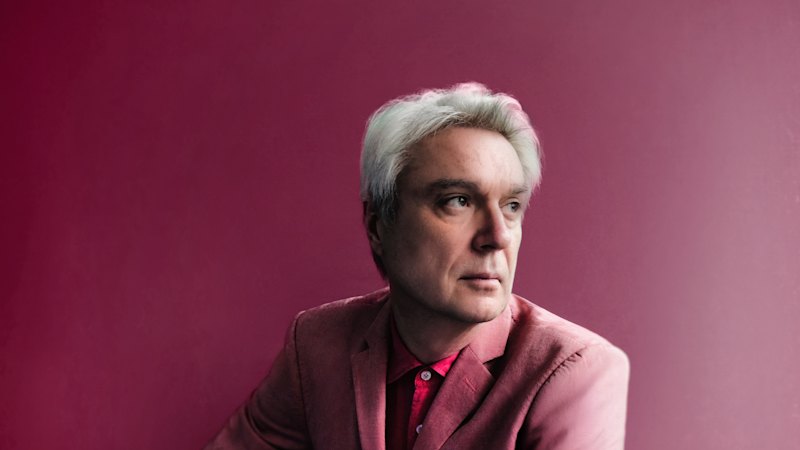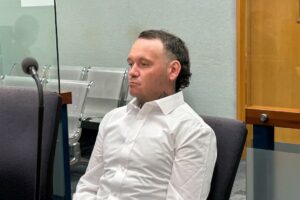
Normal text sizeLarger text sizeVery large text size
Somehow David Byrne and I start by talking about propelling pencils, a marvel of our respective childhoods, which leads through the glories of those big boxes of coloured pencils to the kind you could mix with water to make a thin paint. He lights up at the thought of them. Before Talking Heads, before music came to find him, Byrne was going to be a fine artist, exhibiting in galleries. Over the years, he has been a sometime actor and filmmaker, written a very successful musical about Imelda Marcos (Here Lies Love) and slithered down all kinds of musical rabbit-holes: Latin dance, Nigerian ’70s pop, Arabic instrumentation. He even tried stand-up comedy.
“I like to think that, in some ways, the medium doesn’t matter,” he says. “You have to have a certain amount of skill and develop it, but the creative expression can come through any of these media. I know when I applied to university, I applied to science and engineering as well as an art school. I felt there was creativity in both areas.” Strange to think that, in any number of parallel universes, Talking Heads never existed and that, perhaps, an engineer called David Byrne has just retired from designing bridges. During the pandemic, which kind of was a parallel universe, he didn’t write a single song. Instead, he found himself drawing again.
Loading
“Images that had to do with the body, the body in a landscape or the body AS a landscape – because our bodies were holding us prisoner,” he says. He did try to write songs. “But it seemed this thing [that] was happening was much bigger than any song I might write. I just couldn’t find a way to address it.” He came up with something funny called Six Feet Away. “Which was about being attracted to someone six feet away, but that’s as close as you could get,” he says, snorting with laughter. “But I realised no, people are dying. This is not maybe the time. So I put it aside.”
When that strange time came to an end, his creative tide turned again. He gathered his drawings into a book, then wrote an upbeat song that is a tribute to his apartment, his solitary safe space where he spent locked down evenings watching old movies and cooking things he had never made before. Another song, you might say, about buildings and food.
My Apartment Is My Friend is the third song on Who Is the Sky?, Byrne’s forthcoming album made in collaboration with New York chamber ensemble Ghost Train Orchestra. It is a collection of observational little stories, picking up on small things and fantasies that are quirky even by the standards of his songbook. One song imagines meeting Buddha socially, chatting over finger food at a party. Another is a fable about his transformation after using a magical moisturiser. The chosen single, Everybody Laughs, is a jolly romp celebrating things “everyone” does, although they do include “everyone” wearing each other’s shoes. “Which not everybody does, but I have done,” he said in the new record’s promotional notes.
David Byrne (foreground) in a scene from American Utopia. Credit: HBO
At a time when many Americans – certainly the kinds of Americans who are his fans – feel they are living through a perpetual political crisis, Who Is the Sky? is strikingly concentrated on small things. From the writer of Life During Wartime and Once in a Lifetime comes a song about a meet-cute (A Door Called No) and a whimsical reflection on the frequency with which he needs his “honey” – his fiancee, writer Mala Gaonkar – to fill him in on the plots of films they have just seen (She Explains Things to Me). At his 2018 stage show American Utopia (filmed by Spike Lee in 2020), he used the platform to urge everyone to vote. Later, people left shouting at the stage when he and his troupe delivered a searing version of Janelle Monae’s Say His Name. Where are those big issues?
“I think I’m addressing those kinds of things obliquely,” he says. “There’s a kind of hopeful feeling that comes across the record. When I was writing and recording, that was kind of unconscious. I was doing it for myself. But now when I look back on it, I think I was trying to make something that is a counterforce to the partisan negativity that is out there all the time. Not directly addressing it, but trying to create a feeling that will help us see that no, it doesn’t have to be like that. I think I did that in American Utopia as well. You know what they say in the theatre: show, don’t tell. So rather than preach about working with other people, show that it can be done.”
Talking Heads (from left) Chris Frantz, Tina Weymouth, David Byrne and Jerry Harrison in 1977.Credit: Getty Images
Yes, he agrees, he does fix on everyday details. Maybe more than he used to do, perhaps not. “You can find the world in a grain of sand, and you can also pick a moment or a really specific thing and let that stand for something larger. I think that allows you to relate to it better. Because if it’s something specific, everybody knows what that is.” The song about explanations was sparked by Rebecca Solnit’s essay Men Explain Things to Me. “It’s about mansplaining. And I thought well, I often experience the opposite of that, where a woman has to explain things to me.” Although, he admits with another chortle, it is different when you have asked.
At 73, Byrne refuses to become a legacy act. It would be easy enough to cash in by playing the hits. Talking Heads formed in 1975 when Byrne moved into a cold-water loft with bassist Tina Weymouth and drummer Chris Frantz, whom he met at Rhode Island School of Design; multi-instrumentalist Jerry Harrison joined a little later. They officially split in 1991, but the last of their eight great studio albums, Naked, was released in 1988. It was an acrimonious break-up, even by rock’n’roll standards; as recently as 2022, Tina Weymouth recalled in an interview how difficult she found working with Byrne. “You really had to walk on eggs. He could be a bully, but you couldn’t do it to him. He could be unfaithful, but you had to be loyal. It’s very Trumpian, in a way.”
Byrne in the 1984 concert film Stop Making Sense.Credit: Richard E. Aaron/Redferns
Byrne admits he wasn’t easy to work with; he had strong ideas of exactly how everything should be at a time of life when, as he says now, everything seems urgent. “I remember being much more dogmatic and demanding, saying it has to be like this and this.” Which, he agrees, doesn’t make for a happy ship. “You can see why, not just in Talking Heads, but in a lot of bands at that age, where everyone has strong opinions, that inflexibility is a lot to deal with. And I blame myself as much as anyone else.” He is more forgiving now, he says. If a collaboration doesn’t work, “I’m more like ‘OK, that didn’t work’. Or it could be ‘that worked better than I expected!’ I’ve got more accepting that you just have to go with it.”
The former Talking Heads were all comfortable enough with each other, however, to do the chat show circuit together in 2023 to promote a digitally remastered version of Stop Making Sense, Jonathan Demme’s masterful film of their 1984 concert tour. Byrne’s solo records are well reviewed; his numerous collaborations, with artists from Brian Eno to St Vincent, showed a curious mind working harder than others; there was excitement around the new projects. American Utopia, his touring show inspired by his reading of Alexis de Tocqueville’s Democracy in America, was one of the best pieces of theatre I’ve seen.
None of this enthusiasm, however, could match the frenzy of hope that erupted among fans when the four former Talking Heads appeared together on The Late Show, talking about the film that recorded their moment of greatest artistic triumph. There they were, talking at last. This had to mean that the heroes of CBGB were about to reunite. A quick look at Reddit showed just how huge that longing was. “I would give a kidney to see that,” wrote one fan.
“Oh, my God!” says Byrne, hearing this. Talking Heads, he restates for the record, will never play again. Of course, he understands nostalgia; he is a music fan too. “For all of us, there is maybe a period in our lives, maybe late teens or early 20s, where the music you’re hearing is at a formative time in your life, where the music has a lot of meaning,” he says. “It’s helping you become who you are and understand the world and has a really strong effect on people, and later, people maybe don’t have the time to listen to music, or they have other interests, so they would love to be able to recapture and recreate that moment of passion and how important music was for them. Can I push a button and have that happen again?
“But no, you can’t. You just can’t do that. I will say it’s nice when you see some groups reunite and get the kind of acclaim they didn’t quite get the first time around.” He is happy to see Pulp playing touring arenas now, for example. “They would never have played anything that large back in the day. Now they’re getting the acclaim and probably some of the money that was well deserved back in the day, but they didn’t get it, so good for them. But I felt like with Talking Heads we got that recognition.”
Byrne again collaborates with St Vincent on the new album.Credit:
What pleased him most about the film’s re-release were the young audiences he saw in cinemas and who would come up to him afterwards. “Kids in their 20s who said how much they loved the film and the show we made, that it meant something to them.”
Byrne had never dropped out of view, but the revival of Stop Making Sense put him in the spotlight. Just before he announced the new album, he did a rollicking version of Burning Down the House at the Governor’s Ball with Olivia Rodrigo – both of them in bright red outfits, hers rather skimpier than his bib-and-brace red overalls, which he is also wearing for our interview – that deservedly went viral. Hayley Williams sings with him on the new album. The album was produced by Kid Harpoon, best known for producing pop singers including Miley Cyrus and Harry Styles.
Loading
“I chose him because while maybe they’re not typical, I think of these as pop songs,” Byrne says. “I thought, I want that sensibility, the sensibility of what a pop song is, how it draws you in, holds your attention, guides you in a certain way and has a rhythm you can relate to. I wanted to mix that with me collaborating with the Ghost Train Orchestra and see if I can bring what might be seen as opposing sensibilities together. I thought he might be able to do that.”
It was Kid Harpoon who insisted that these songs were stories and his voice should be clear. “He said: ‘We have to let the music make way for what you’re telling us’.”
He agreed; if his enunciation is not clear, he says, he is happy to be corrected. “I don’t want to hide what I’m saying,” David Byrne says. “I want to be understood.”
Who Is the Sky? (Matador/Remote Control) is out September 6.
David Byrne performs at Brisbane Entertainment Centre, January 17, the ICC Theatre, Sydney, January 21, 2026 and Sidney Myer Music Bowl, January 22, 2026 and the Adelaide Entertainment Centre Arena, January 24 and RAC Arena, Perth, January 27.





